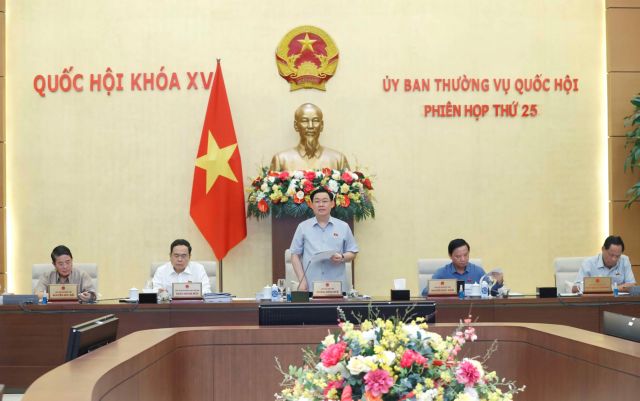 Politics & Law
Politics & Law


|
| National Assembly Chairman Vương Đình Huệ delivers the session's opening speech. — VNA/VNS Photo Doãn Tấn |
HÀ NỘI — The National Assembly (NA) Standing Committee convened its 25th session in Hà Nội on Monday under the chair of NA Chairman Vương Đình Huệ, with the draft revised Law on Water Resources tabled for discussion.
The draft Law was deliberated in the fifth session of the 15th National Assembly. The majority of opinions endorsed the necessity of issuing the law and agreed with many contents.
During the session, NA Chairman Huệ emphasised the importance of surface water, saying that the management and protection of this water source have not been adequately addressed.
He noted the lesson from Hà Nội, which used 100 per cent clean water from surface water sources but lacked a monitoring system to ensure water source safety. In the case of pollution incidents, the impact on water security and safety would be significant.
Huệ suggested that the drafting agency should study and consider adding a fundamental principle regarding the protection of surface water in the draft revised Law on Water Resources.
Emphasising the need for efficient and sustainable water use, he said that there might be cases where meeting water recycling requirements didn't align with the efficiency expectations of investors, yet it was essential to ensure overall economic and social effectiveness.
"If we only talk about efficiency and economy, businesses won't do it," he said, giving the example of the Yên Xá Wastewater Treatment Plant, which didn't recycle water after treatment, leading to higher construction costs.
Through the discussions, the NA Standing Committee said the current water resource management primarily relied on permits. Therefore, it proposed adding regulations on standards and criteria for management and post-audit, enabling citizens to participate in water resource management.
Reporting on major issues in the draft revised law, Chairman of the NA's Committee on Science, Technology, and Environment Lê Quang Huy stated that many opinions supported the scope of adjustments in the draft law. However, some opinions suggested that this law should only be adjusted concerning water resources, not water exploitation and use.
Huy said the revision of the law included four major policy areas such as ensuring water resource security, privatising the water sector, protecting water sources from pollution and depletion, and preventing and mitigating the adverse effects caused by water to comprehensively manage all water-related issues.
Furthermore, the draft law inherited the provisions of the current Law on Water Resources, which broadly applied to water exploitation within the framework of water source preservation. Detailed regulations regarding water exploitation and use in specific fields and scopes would be implemented in accordance with specialised legal provisions. Therefore, the committee recommended retaining the content of water exploitation and use within the scope of the draft law.
Replying to opinions to add natural mineral water and hot spring water to the law, the committee said natural mineral water and hot spring water had unique physical and chemical properties and higher economic value than ordinary water. Therefore, strict and precise management requirements were necessary.
These two types of water were currently managed under mineral resource laws. Therefore, they should not be added to the law to avoid confusion. This was also the option presented by the Government to the NA.
There were opinions about a provision related to water recycling and reuse, specifying the mandatory application of treated wastewater for certain purposes, promoting the use of recycled water, and offering incentives for using water in various sectors such as household, agriculture, industry, and other purposes.
The NA Standing Committee’s 25th session is divided into two phases, with the first from August 14-18, and the second from August 24-25.
The meeting will have to deal with the heaviest-ever workload since the beginning of this year, with 21 contents, focusing on supervision work, law-making, and other important matters.
Notably, the thematic supervision session of the committee will be broadcast live on radio and television channels for the first time, contributing to promoting democracy, publicity, and transparency in the operation of the legislative body.
The question & answer session will take place for one day, looking into matters under the management of the Ministry of Justice and the Ministry of Agriculture and Rural Development (MARD).
For the Ministry of Justice, queries will focus on the law and ordinance-making programme, solutions to improve the quality of the legal system, as well as how to deal with limitations and wrongdoings in the issuance of documents detailing laws and resolutions adopted by the NA, and ordinances and resolutions by the NA Standing Committee, among other issues.
For the MARD, the committee will scrutinise solutions to remove obstacles to agricultural product exports and lift the “yellow card” warning imposed by the European Commission (EC) on Vietnamese seafood, along with food security and rice exports.
Full-time legislators are scheduled to discuss a number of reports on supervision results, and draft supervision plans, and make decisions on some important matters.
Regarding law-making, they will opine on eight out of the nine draft laws that were debated at the fifth sitting of the legislature, held from May 22 to June 24, and two new others.
They include the draft revised Law on Real Estate Business, the draft revised Land Law, the draft revised Housing Law, the draft Law on Management and Protection of National Defence Works and Military Zones, the draft Law on forces participating in the protection of security and order at the grassroots levels, the draft revised Law on Citizen Identification, and the draft revised Law on Social Insurance. — VNS